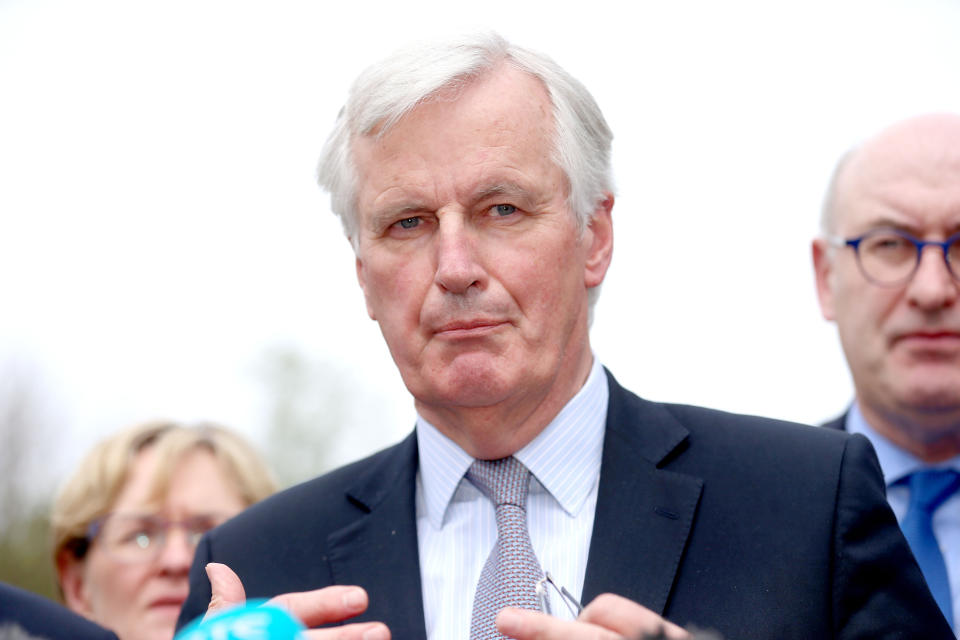Brexit transition period could be extended to three years

The Brexit transition period could be extended to three years as government negotiators seek more time to organise the departure from the European Union, it has been reported.
Britain is scheduled to leave the EU at midnight on March 29, 2019, but a number of newspapers say an extension beyond the scheduled transition period of 21 months is a possibility.
Negotiators in Brussels are sceptical that a Brexit trade deal can be agreed by the end of 2020.
The UK government is considering asking for an extension because it is strapped for time to prepare for Brexit.

Prime minister Theresa May has previously said she wants a transition period of ‘around two years’, while European Commission negotiator Michel Barnier said it should run until the end of 2020.
Most popular on Yahoo News UK
Heartbroken daughter urges people who robbed her parents’ house to come to her father’s funeral
Brexit could cause higher energy prices and power blackouts, warns Lords committee
Israel outcry at plans to outlaw blaming Poland for Holocaust crimes
Interactive fitness app raises security concerns after revealing location of secret US military bases
But it has been reported that UK officials are concerned that the deadline is unrealistic, calling for a transition that stretches to almost three years, bringing it into 2021.
However, Downing Street dismissed suggestions there would be a three-year transition period.
A spokesman said Mrs May was aiming for a transition period that lasted ‘around two years’.
Meanwhile, EU ministers agreed on their own negotiating position on Monday, proposing that the transition runs from Brexit in March 2019 to December 31, 2020.
BREAKING: EU General Affairs Council adopts guidelines for #Brexit negotiations within 2 min: status quo transition without institutional representation, lasting from #Brexit date to 31 December 2020 pic.twitter.com/3BSrNY3qbF
— Sabine Weyand (@WeyandSabine) January 29, 2018
Mrs May is facing increasingly vocal complaints from Leavers in her party that she is preparing to deliver a Brexit “in name only” because the UK will follow EU rules during the transition.

Several backbenchers broke cover over the weekend to criticise her lack of action on domestic issues.
Eurosceptic former Cabinet minister Theresa Villiers said she was worried about a “dilution of Brexit” while Remainer Heidi Allen told the PM to “get a grip” because the Tories are “letting this country down”, and former minister Rob Halfon appeared to liken Mrs May to a “tortoise”.
A weekend of bloodletting which raised fresh speculation about a potential leadership challenge threatened to get worse after the Telegraph obtained a WhatsApp message sent by energy minister Claire Perry in which she branded Brexiteers concerned about the £39 billion EU divorce bill as “swivel-eyed” elderly men with no mortgages or young children.
There were calls for Mrs May to sack Chancellor Philip Hammond, who enraged Brexiteers by saying trade relations with the EU would change only “very modestly” and that the UK should seek a “middle way”.
Intensifying Tory infighting will not go unnoticed in Brussels, where the EU General Affairs Council is expected on Monday to approve guidelines for chief negotiator Michel Barnier to follow during talks on a post-Brexit transition period.
The basic principles are likely to be that Britain must follow “the whole of the EU acquis”, or law, but no longer participate in the institutions and decision-making of the bloc, while complying with European Court of Justice (ECJ) rulings and paying into the budget.

 Yahoo News
Yahoo News 

